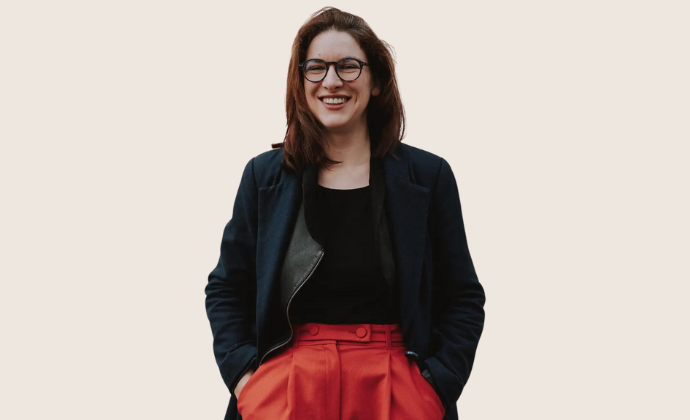Karolina Kania: My goal is to connect academic, business and non-profit environment
Mgr. Karolina Kania, Ph.D. is an anthropologist and assistant professor at the Department of Strategy, Faculty of Business Administration, Prague University of Economics and Business. She also works as a researcher at the Centre for Family Business at the Prague University of Economics and Business. In November 2021 she defended her doctoral dissertation in social anthropology and ethnology at the École des hautes études en sciences sociales in Paris. As part of her dissertation, she conducted qualitative research on social and political issues related to tourism development in New Caledonia and on tourism development strategies in relation to indigenous communities in this French territory. Her current research focuses on growth strategies and succession in family wineries in the Czech Republic. She is currently working on a scientific study “Paradox and Growth: Examining Entrepreneurship in Czech Family Wineries” where other colleagues from the Centre for Family Business (Lorraine M. Uhlaner, Ph.D., Ing. Martin Jurek, Ph.D., doc. Ing. Aleš Kubíček, Ph.D.) have contributed. We interviewed Karolina on her current professional focus.
During the summer you started the first set of interviews with Czech winemaking families. What areas do you plan to explore in your research?
With nearly 18,000 hectares of vineyards and a long history of winemaking, the Czech wine industry is characterized by its rich tradition and diverse range of winery enterprises. Many of these wineries have been passed down through generations, making them an ideal setting for exploring the entrepreneurial heterogeneity within family-owned businesses. In the first exploratory phase of our research, I had a possibility to gain insights into how family firms sustain their enterprises over time, balancing the expectations of family heritage with the challenges of modern business practices.
Key areas of focus in our study titled “Paradox and Growth: Examining Entrepreneurship in Czech Family Wineries,” include the role of tradition, the level of familial involvement, and how family goals—both personal and professional—align or conflict with business objectives. We are interested in how these elements influence entrepreneurial decision-making, particularly regarding growth and diversification. We hope that our research will contribute to a deeper understanding of how Czech family wineries manage the tensions between family continuity and entrepreneurial ambition, offering valuable insights into the mechanisms that drive or hinder their business decisions.
Why did you focus on family businesses? I imagine that the tension between tradition and current business challenges is being experienced by other forms of wine businesses as well.
We chose family firms because they provide a unique environment where personal relationships and professional ambitions intersect, often resulting in complex decision-making processes. At the Centre for Family Business at the Prague University of Economics and Business, we have extensive experience studying the heterogeneity of family firms, including their innovations and strategic orientations. However, we have not yet focused on family businesses within the wine sector. Czech family wineries are particularly interesting due to their deep-rooted traditions, generational continuity, and the potential for both conflict and innovation as they grow and diversify. These characteristics make them an ideal context for examining the entrepreneurial paradox of balancing family values with business growth.

Can other winemaking families join the interviews? Are there any requirements for being selected?
We look forward to the possibility of including more family-owned wineries in this study and learning from their unique experiences. To participate, at least two family members must be actively involved in the ownership or management of the winery, the family must hold the majority of ownership, and the business must identify itself as a family enterprise. These criteria ensure that we capture the dynamics between family and business roles, which are crucial for understanding the paradoxes that influence entrepreneurial decision-making. Additionally, we aim to include a diverse range of wineries based on factors such as growth strategies, generational involvement, and diversification into activities like agritourism, to enrich the study’s findings. All research data will be anonymized to ensure the privacy and confidentiality of the participating families and their businesses. If you are interested in joining our study and contributing to this research, we would be delighted to hear from you. Please feel free to reach out for more information or to express your interest by contacting me at karolina.kania@vse.cz.
Research is only one part of your job. In which courses and departments can students of the Prague University of Economics and Business meet you?
At the Prague University of Economics and Business, I am a member of the Department of Strategy. I teach courses focused on qualitative research methods, including Design Anthropology in Business Practice, UX Research, and Research Methods. I also teach a course on UX Principles, where students learn about user experience design and its practical application. Over the past four years, I have facilitated collaboration between students and NGOs, startups, and state institutions. I have supervised more than 20 UX research projects for organizations such as the National Pedagogical Institute, MFDF Ji.hlava, Czechitas, Artotéka of the Moravian Gallery in Brno, prgAI, and #HolkyzMarketingu, among others.
In addition, I am working on two research projects: our study on family-owned businesses in the winery sector and Horizon REMAKING project, where I contribute by applying ethnographic methods to examine remote working in the context of enforced migration triggered by the war in Ukraine. Furthermore, I am exploring options for publishing my PhD thesis, which focused on the socio-political challenges and conflicts within tourism development in New Caledonia, a French overseas territory in the South Pacific.
You have an overlap into work outside academia. What do you do professionally besides the university?
Beyond my academic work at VŠE, I am actively involved in research projects and consultancy efforts, particularly in the areas of UX and CX research. Previously, I worked at B&T Lab, a business design studio, where I founded the Insights Department and established UX research processes. I am also deeply passionate about intercultural education and experiential learning. As a member of the European Pool of Trainers by the European Federation for Intercultural Learning, I share my expertise through volunteer work for AFS Intercultural Programs. My professional goal – and passion – is to bridge the worlds of academia, business, and the third sector organizations.
